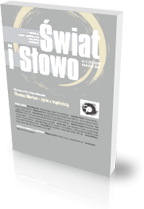O demokracji, czyli postkolonialne aspekty dyskursów IV Rzeczypospolitej
On Democracy, or Post-Colonial Aspects of the Discourses in the Fourth Republic of Polan
Author(s): Janusz KorekSubject(s): Semiotics / Semiology, Applied Linguistics, Semantics, Pragmatics, Sociolinguistics, Descriptive linguistics
Published by: Akademia Techniczno-Humanistyczna w Bielsku-Białej
Keywords: democracy;post-colonialism;post-Sovietism;the language of power of the Fourth Republic;Poland;Central and Eastern Europe;European Union;Jarosław Kaczyński;Law and Justice;authoritarianism;discursive analysis;
Summary/Abstract: For about two years, the language of the new authorities has been constituting in Poland, made up by the comments of Jarosław Kaczyński, Chairman of the Law and Justice (PiS) party, and enunciations of the most important state officials and experts loyal to the ruling party, members of parliament, senators, Catholic church authorities and journalists who support the idea of the so-called “Good Change.”Many important, sometimes controversial words spoken by the representatives of the ruling camp appeal or directly concern democracy, its principles of operation or legitimacy. Due to the specificity, repetitive nature and regularity of these statements,one may speak of the formation of a “PiS-style democracy” discourse. The main rules of its formation are imposed by the chairman and ideologist of the ruling party and its programming documents. The presented article is therefore based primarily on statements made by the Chairman of Law and Justice and on the party’s official programme. The starting point is the hypothesis that the PiS-style democracy discourse and discourse formations in the Fourth Republic of Poland analysed in the article do not only recall or paraphrase slogans dating back to the Polish People’s Republic, but they also use cognitive categories, thought patterns and reasoning in line with the discourses imposed on Poles by the Soviets in the PPR era.The analysis shows that the discourses of the new authorities, in particular the PiS-style democracy discourse, emerge according to the rules of the discourses of Soviet dictatorship of the proletariat, as well as the democratic dictatorship of the PPR, imposed on Poles by the Soviet Union after World War II. Similarly, statements made by the representatives of the ruling camp concerning the development patterns of the economy and political practices, emerged under the influence of the rules of the Marxist-Leninist doctrine and the discourses of democracy in the Polish People’s Republic. The PiS-style democracy discourse evokes their key ideologemes and uses their typical thought patterns. As such, it is a post-colonial discourse not only due to the fact that it refers to slogans such as “do not interfere in the internal affairs of Poland” (one of the slogans most frequently used by the USSR: “do not interfere in the internal affairs of the USSR”) or “the street and the foreign powers” (similar to the Soviet call to “fight against internal reaction forces”and “foreign diversion centres”) or, concerning economy: “we will catch up with and defeat the West”... there are many comparisons like the ones presented above. The PiS-style democracy discourse can be first and foremost classified as post-Soviet, due to the fact that the monopoly on defining the “true” policy lies in the hands of Jarosław Kaczyński and his party, as the only infallible experts in the will of the people and nation. The voice of the party (or Jarosław Kaczyński) is therefore considered more important than the constitution, the letter of the law andthe judicial power, which should be subject to it. As it was the case with democratic dictatorship discourse in the Polish People’s Republic, in which the monopoly on political practices and defining politics was in the hands of the Polish United Workers’ Party and the duty of the judicial power was to guard this exclusive right. The PiS-style democracy discourse is becoming more and more similar in its form to the PPR discourse, differing primarily in the fact that “nation” replaced “proletariat” in the position of “the sovereign body”, however, both collectives demand full and “real” subjectivity. Similarly to the Marxist-Communist discourse, the PiS-style democracy discourse treats politics primarily as a theatre of shadows, in which scenes and events actually take place elsewhere – in another, “real” theatre. Ultimately, the welfare of individual citizens or the security of civil society are not important, just as the true (discernible) will of the proletariat or the sovereign nation. After all, Jarosław Kaczyński, is not interested in public discussion, social consultations or any other kind of empirical determination of this will, like the management and strategists of his party and the government formed by Law and Justice. Therefore, the risk of authoritarianism inherent in the PiS-style democracy discourse is high because, once again – just as in the discourses of the Soviet coloniser – it combines, on the one hand, a utopian vision of direct popular and national democracy and, on the other hand, an imperative of a “higher necessity”, which may make the intentions of the people “rising up from their knees” to carry out a temporary “revolution”,which may lead us to a permanent socialist and nationalist dictatorship.
Journal: Świat i słowo
- Issue Year: 2/2017
- Issue No: 29
- Page Range: 33-74
- Page Count: 42
- Language: Polish

